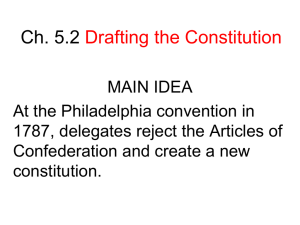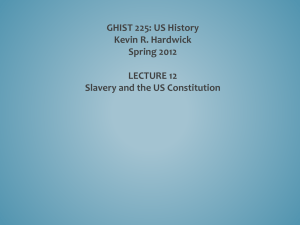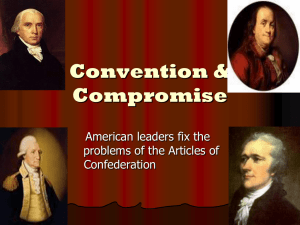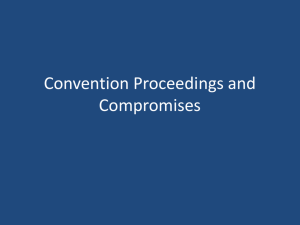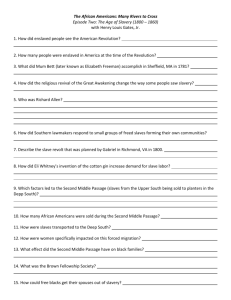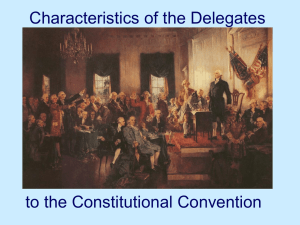Lesson Plan: Constitution Day Simulation Roles
advertisement
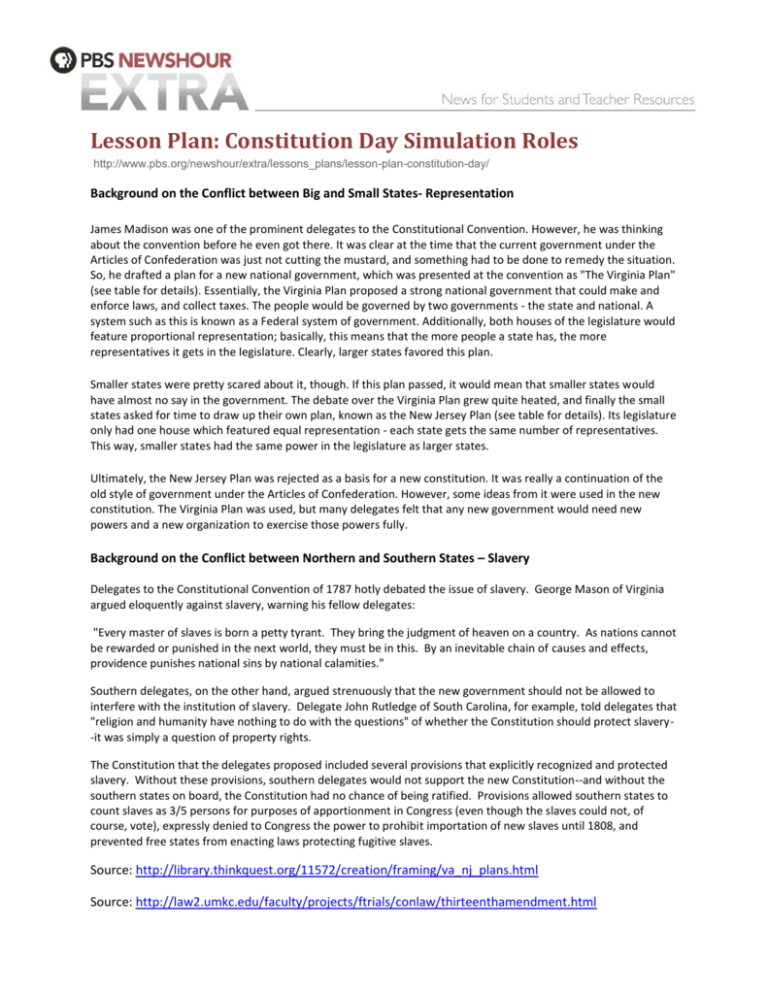
Lesson Plan: Constitution Day Simulation Roles http://www.pbs.org/newshour/extra/lessons_plans/lesson-plan-constitution-day/ Background on the Conflict between Big and Small States- Representation James Madison was one of the prominent delegates to the Constitutional Convention. However, he was thinking about the convention before he even got there. It was clear at the time that the current government under the Articles of Confederation was just not cutting the mustard, and something had to be done to remedy the situation. So, he drafted a plan for a new national government, which was presented at the convention as "The Virginia Plan" (see table for details). Essentially, the Virginia Plan proposed a strong national government that could make and enforce laws, and collect taxes. The people would be governed by two governments - the state and national. A system such as this is known as a Federal system of government. Additionally, both houses of the legislature would feature proportional representation; basically, this means that the more people a state has, the more representatives it gets in the legislature. Clearly, larger states favored this plan. Smaller states were pretty scared about it, though. If this plan passed, it would mean that smaller states would have almost no say in the government. The debate over the Virginia Plan grew quite heated, and finally the small states asked for time to draw up their own plan, known as the New Jersey Plan (see table for details). Its legislature only had one house which featured equal representation - each state gets the same number of representatives. This way, smaller states had the same power in the legislature as larger states. Ultimately, the New Jersey Plan was rejected as a basis for a new constitution. It was really a continuation of the old style of government under the Articles of Confederation. However, some ideas from it were used in the new constitution. The Virginia Plan was used, but many delegates felt that any new government would need new powers and a new organization to exercise those powers fully. Background on the Conflict between Northern and Southern States – Slavery Delegates to the Constitutional Convention of 1787 hotly debated the issue of slavery. George Mason of Virginia argued eloquently against slavery, warning his fellow delegates: "Every master of slaves is born a petty tyrant. They bring the judgment of heaven on a country. As nations cannot be rewarded or punished in the next world, they must be in this. By an inevitable chain of causes and effects, providence punishes national sins by national calamities." Southern delegates, on the other hand, argued strenuously that the new government should not be allowed to interfere with the institution of slavery. Delegate John Rutledge of South Carolina, for example, told delegates that "religion and humanity have nothing to do with the questions" of whether the Constitution should protect slavery-it was simply a question of property rights. The Constitution that the delegates proposed included several provisions that explicitly recognized and protected slavery. Without these provisions, southern delegates would not support the new Constitution--and without the southern states on board, the Constitution had no chance of being ratified. Provisions allowed southern states to count slaves as 3/5 persons for purposes of apportionment in Congress (even though the slaves could not, of course, vote), expressly denied to Congress the power to prohibit importation of new slaves until 1808, and prevented free states from enacting laws protecting fugitive slaves. Source: http://library.thinkquest.org/11572/creation/framing/va_nj_plans.html Source: http://law2.umkc.edu/faculty/projects/ftrials/conlaw/thirteenthamendment.html Role 1- The Small State You have a small state population. You support the New Jersey Plan and will not agree to pass the Virginia Plan. The New Jersey Plan Branches Three - legislative, executive, and judicial. The legislature appoints people to serve in the executive branch, and the executive branch selects the justices of the Supreme Court. Legislature One house (unicameral). States would be represented equally, so all states had the same power. Other Powers The national government could levy taxes and import duties, regulate trade, and state laws would be subordinate to laws passed by the national legislature. Role 2- The Large State You have a large state population. You support the Virginia Plan and will not agree to pass the New Jersey Plan. The Virginia Plan Branches Three - legislative, executive, and judicial. The legislature was more powerful, as it chose people to serve in the executive and judicial branches. Legislature Two houses (bicameral). The House of Representatives was elected by the people and the Senate was elected by the state legislatures. Both were represented proportionally. Other Powers The legislature could regulate interstate trade, strike down laws deemed unconstitutional and use armed forces to enforce laws. Role 3- Southern States You come from a Southern State with an agrarian economy and your people’s livelihood depends on slavery. You support legislation that will allow you to continue your way of life. Pro-Slavery Arguments from Southern States Voting Representation The continuation of the use, sale, and importing of slaves Returning escaped slaves You insist that your slaves count in some way as part of your population because it means more representation for you in the House of Representatives. You demand to uphold your right to own slaves and use them as desired as they are considered property. Without them your economy would collapse Slaves are property and should be returned to their masters if they escape Role 4- Northern States You come from a Northern State with an economy that does not depend on slavery. You believe that the trade should be outlawed and that slaves should not be able to count as people in terms of representation in the government. Anti-Slavery Arguments from the Northern States Voting Representation Slavery is immoral Slaves who escape to the North should be considered free If slaves are considered property and cannot vote then they should not be counted as a person in terms of representations. Slavery itself is immoral and it will reflect badly on the entire country If slavery is not legal in a northern state then an escaped slave should be able to live there freely
